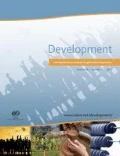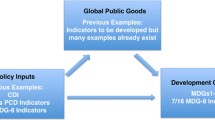Abstract
The article argues that simply adding new goals (such as peace, security, and human rights) to the post-2015 agenda is not enough; there needs to be a focus on the structural and policy factors that perpetuate poverty, in particular to ensure that the future development agenda is not hijacked by a resurrected Washington Consensus. It goes on to propose a 7-point agenda: climate stabilization, financial re-regulation and debt cancellation, inequality reduction, food security, de-commodification, comprehensive social protection, and industrialization.
Similar content being viewed by others
Notes
‘Good Growth and Governance for Africa: Rethinking Development Strategies’, draft; http://policydialogue.org/files/publications/Africa_Noman_Stiglitz.pdf.
Richard Kozul-Wright and Jayati Ghosh, http://www.guardian.co.uk/global-development/poverty-matters/2013/feb/05/post-2015-development-global-new-deal.
Jomo Kwame Sundaram, Anti-Poverty 2.0, http://www.project-syndicate.org/commentary/rethinking-anti-poverty-programs-and-policies-by-jomo-kwame-sundaram.
These recommendations have now been incorporated in the report of the High Level Panel on the post-2015 development agenda.
References
Chandy, Laurence and Geoffrey Gertz (2011) ‘With Little Notice, Globalization Reduced Poverty’, Yale Global Online, http://yaleglobal.yale.edu/content/little-notice-globalization-reduced-poverty, accessed 5 July 2013.
Cichon, Michael (2004) Financing Social Protection. Geneva: International Labor Organization.
de Schutter, Olivier (2013) ‘The Case for a Global Fund for Social Protection’, Recovery with a Human Face List, 11 March.
Desmarais, Annette (2007) La Via Campesina: Globalization and the power of peasants. London: Pluto Press.
Harvey, David (2006) Spaces of Global Capitalism. London: Verso.
Kozul-Wright, Richard and Jayati Ghosh (2013) ‘Forget post-2015 development goals – a global new deal is what is needed’, Poverty Matters Blog, The Guardian, 5 February 2013, available at http://www.theguardian.com/global-development/poverty-matters/2013/feb/05/post-2015-development-global-new-deal, accessed 5 July 2013.
Lin, Justin Yifu (2012) The Quest for Prosperity: How developing economies can take off. Princeton: Princeton University Press.
Lowry, Ann (2012) ‘Dire Poverty Falls Despite Global Slump, Report Finds’, New York Times, http://www.nytimes.com/2012/03/07/world/extreme-poverty-down-despite-recession-world-bank-data-show.html?_r=1&#commentsContainer, accessed 5 July 2013.
UN (2011) Accelerating progress towards the Millennium Development Goals: options for sustained and inclusive growth and issues for advancing the United Nations development agenda beyond 2015: Annual Report of the Secretary-General, 11 July 2011. New York: UN Report No. A/66/126, available at: http://www.ipc-undp.org/pressroom/files/ipc629.pdf, accessed 5 July 2013.
Weitzman, Hal (2012) Latin Lessons: How South America stopped listening to the United States and started prospering. Hoboken: John Wiley and Sons.
World Bank (2012) Turn Down the Heat. Washington DC: World Bank.
Additional information
This piece was written at the urging of Minar Pimple and Charles Abugre of the Millennium Development Campaign, who reviewed it before its dissemination. Regardless of the errors and shortcomings this piece has are, however, attributable to the author alone.
Calls for a focus on the structural and policy factors that perpetuate poverty to ensure that the post-2015 agenda is not hijacked by a resurrected Washington Consensus
Lowry (2012) notes, ‘for the first time the proportion of people living in extreme poverty – on less than $1.25 a day – fell in every developing region from 2005 to 2008. And the biggest recession since the Great Depression seems not to have thrown that trend off course, preliminary data from 2010 indicate’.
Rights and permissions
About this article
Cite this article
Bello, W. Post-2015 Development Assessment: Proposed goals and indicators. Development 56, 93–102 (2013). https://doi.org/10.1057/dev.2013.10
Published:
Issue Date:
DOI: https://doi.org/10.1057/dev.2013.10




